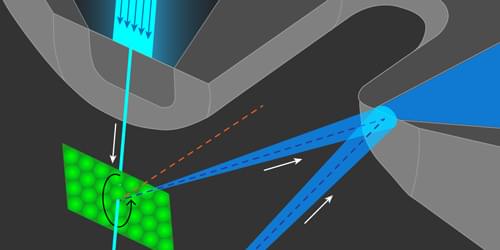Researchers have developed an atom-diffraction imaging method with micrometer spatial resolution, which may allow new applications in material characterization.
Microscopy with atoms offers new possibilities in the study of surfaces and two-dimensional (2D) materials [1]. Atom beams satisfy the most important requirements for microscopic probing: they can achieve high contrast and surface-specificity while doing little damage to the sample. A subtype of atomic microscopy—atomic-diffraction imaging—obtains measurements in reciprocal, or momentum, space, which is ideal for studying the surfaces of large and uniform crystalline samples. However, scientists developing this technique face challenges in achieving micrometer-scale spatial resolutions that would allow the study of polycrystalline materials, nonuniform 2D materials, and other surfaces without long-range order.
